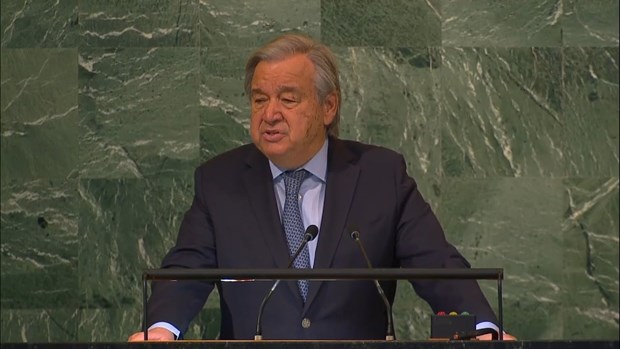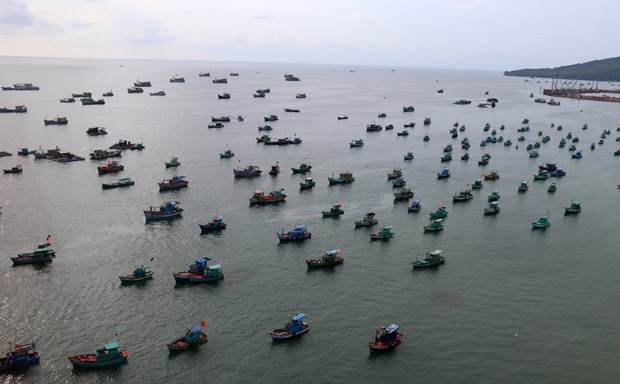UNCLOS 1982 a comprehensive multilateral legal framework at sea
The United Nations Convention on the Law of the Sea (UNCLOS) was officially signed on December 10, 1982. Over the past four decades, the convention has been an international legal document of universal value, helping countries establish a comprehensive, fair and peaceful legal order at sea. Notably, it is suitable to the sustainable development goals of humankind.
 UN Secretary-General Guterres speaks at an official meeting to mark the 40th anniversary of the adoption of the 1982 UNCLOS. (Photo: VNA)
UN Secretary-General Guterres speaks at an official meeting to mark the 40th anniversary of the adoption of the 1982 UNCLOS. (Photo: VNA)The 1982 UNCLOS has affirmed its role as a constitution of the ocean in regulating the legal status of the seas as well as ensuring the legitimate rights and interests of countries in the exploitation and use of the oceans and their resources. It has met the international community's expectation of establishing a new legal order at sea, and of harmonising the rights and interests of nations involved.
On April 30, 1982, the Third United Nations Conference on the Law of the Sea adopted the convention, with 130 votes in favour, four against, and 17 abstentions. Two countries did not cast their ballots.
On December 10, 1982, at Montego Bay in Jamaica, delegations from 117 countries, including Vietnam, officially signed the UNCLOS.
On November 16, 1994, one year after 60 member states ratified it, the document officially entered into force. At that time, 168 members (including countries, territories and institutions) had joined the convention.
The convention has 320 articles, set out in 17 parts, as well as nine annexes. Parts II to XI concern the different maritime zones: territorial sea and contiguous zone, straits used for international navigation, archipelagic waters, the exclusive economic zone, the continental shelf, the high seas, the International Seabed Area, and special provisions on the regime of islands and of enclosed and semi-enclosed seas. Parts XII to XIV concern specific marine activities and questions in all areas: the protection of the environment, marine scientific research, and the development and transfer of marine technology. Part XV (and Annexes 5 to 8) concerns the settlement of disputes. Parts XVI and XVII set out general and final clauses.
UNCLOS 1982 is the most complete and comprehensive international convention of its kind to date, defining the legal status of most parts of the seas and oceans. It has created a fair legal framework that harmonises the interests of different groups of countries, such as between those with and without sea access and between developed and developing nations.
It has also for the first time completed regulations on determining the boundaries of sea areas from internal waters, territorial sea, contiguous zone and exclusive economic zone to continental shelf, high seas, and international seabed area. In particular, the exclusive economic zone regime was born as a result of protecting the economic privileges of developing countries and newly independent ones from the national liberation movement in the early 1960s of the 20th century.
 Illustrative photo (Source: VNA)
Illustrative photo (Source: VNA)On June 21, 2012, the Law of the Sea of Vietnam was approved by the National Assembly, effective from January 1, 2013. It was built on the basis of the provisions of UNCLOS and international law.
The introduction of the law is proof that Vietnam is a responsible member of UNCLOS. This is the concretisation of important legal regulations of UNCLOS serving the protection and management of Vietnam's legitimate rights and interests in the East Sea, and its sovereignty, and national security at sea.
At the same time, the adoption of the law is also a righteous step in line with international law, thereby helping to peacefully resolve differences and disputes in the East Sea./.













